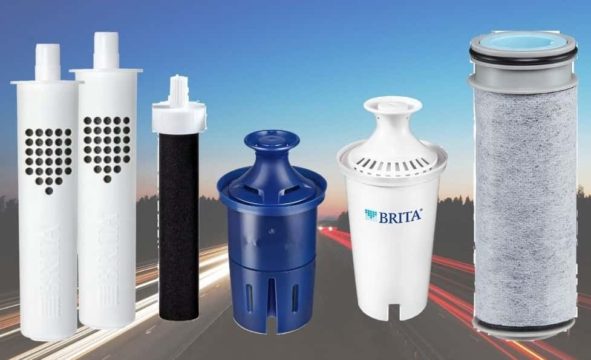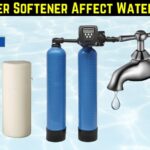Do you have a Brita water filter in your house? If so, you may be wondering if Brita Filter Soften Hard Water.
Filters are a popular choice for people who want to soften their water.
Brita filters work by adding magnesium salts and calcium minerals back into the soft water, which can soften the tap water and make it more pleasant to drink.
However, not all conventional filters are created equal – some work better than others at softening water.
This blog post will discuss the different water softening systems and how well they work at softening water.
We’ll also provide tips on choosing the right Brita filter for you.
Can I Use Hard Water Through A Brita Filter?
You can use Brita filters with low water hardness levels because they are unsuitable for removing hardness contaminants from water.
The high concentration of minerals in hard water, such as calcium and magnesium.
These minerals can build up inside your pipes and appliances, causing them to operate less efficiently.
If you have hard water, you may notice that your clothes come out of the washing machine feeling stiff and your dishes have a white film.
You may also notice that your water heater used to work better than it used to.
Suppose you’re concerned about the hardness of your tap water. In that case, you can have it tested by a qualified water treatment professional.
They can recommend the best way to treat your water quality.
How Do You Soften Hard Water?
Hard water is a widespread problem in many parts of the world.
It can cause several problems in your home, making it difficult to clean your clothes. When you do laundry, leave spots on dishes and glasses after washing them.
Hard water can also cause damage to appliances over time.
You can soften hard water in several ways, like installing a water softener.
This device will remove the mineral damage from the tap water supply as it enters your home, making it softer.
Another option is to use a filtration process to attach to your existing plumbing and remove the minerals.
You can also try some DIY methods to soften hard water.
One popular method is to add a few drops of dish soap to a bucket of water and then use that soft water to wash your dishes or laundry.
It will help break down the heavy metals and make removing them easier. You can also use vinegar or lemon juice as a natural softening agent.
Is There A Special Brita Filter Present To Soften Your Water?

No, there is no special Brita filter specifically for softening water.
However, many other filters can remove permanent hardness from water as their ion exchange filters out impurities.
So, suppose you have hard water and want to use a softening process to help improve its quality. In that case, you can use another water filter or softener to do the softer.
What about Water Conditioners?
Water conditioners are often used with other filtration systems to help improve the quality of your home’s water.
While they are not always necessary, they may benefit certain conditions.
Water conditioners can help remove minerals and other contaminants from your water, improving its water taste and smell.
They can also help prevent buildup in your plumbing system, leading to clogs and other problems.
Suppose you are considering using a water conditioner. In that case, you must talk to your plumber or water treatment professional to determine if one is right for you.
Which Brita Filter Is Best For Hard Water?
If you’re looking for a water filter that can effectively remove hard water minerals from your water. In that case, a water filter pitcher is a great option.
There are a few different ion exchange filters, so which one is best for hard water?
The answer depends on the type of hard water minerals in your water.
Suppose your water is high in calcium and magnesium. In that case, the Brita UltraMax Water Dispenser with 1 Longlast Filter is a good option.
This filter can remove up to 99% of dissolved minerals and contaminants like lead and chlorine.
The Brita Pitcher with 1 Longlast Filter is a good option if your water is high in iron.
This filter cartridge can remove up to 90% of iron and other contaminants like lead, chlorine, and other dissolved solids.
However, Brita filters do not filter out all calcium or magnesium.
You can be confident that your conventional Brita filter will significantly reduce hard water minerals. It makes it healthier and better tasting.
How to Reduce Sodium Consumption?
The American Heart Association (AHA) recommends less than 2,300 milligrams (mg) of sodium daily.
For some people, especially those with high blood pressure, diabetes, or chronic kidney disease, the AHA advises limiting sodium intake to 1,500 mg per day.
You can still benefit from reducing your sodium intake even without health conditions.
There are a few simple ways to reduce your sodium consumption:
- Cook at home more often. When you cook, you have more control over the ingredients that go into your food. It includes the amount of sodium you add.
- Use fresh or frozen ingredients. Canned goods are often high in sodium.
- Read nutrition labels. When you’re buying packaged foods, be sure to check the nutrition label for the sodium content. Aim for foods that have 140 mg of sodium or less per serving.
- Choose low-sodium or no-salt-added options. Many foods come in low-sodium levels varieties. You can find no-salt-added versions of some foods, such as canned tomatoes.
- Use herbs and spices. Use herbs and spices to flavor your food instead of salt when cooking.
- Drink plenty of water. Drinking enough cold water helps flush excess sodium from your body. The AHA recommends consuming eight 8-ounce glasses of water per day.
Reducing sodium intake can be challenging, but your health is worth it. Making even small changes can have a significant impact.
Following the tips above can reduce sodium consumption and improve overall health.
Can Your Brita Filter Soften Tough Water?
If you live in an area with hard water, you may wonder if a Brita filter can help soften it.
The answer is yes! A Brita water filter can help reduce the hardness level of your water by removing some dissolved minerals that contribute to water hardness levels.
It can help improve the taste of your water and make it more comfortable for bathing and cleaning.
If you want a Brita filter to soften your water, check the product label to ensure it’s rated for carbonate hardness removal.
You’ll also want to follow the manufacturer’s instructions for optimal results.
Are The Brita Water Filters Harmful To You?
No, the Brita water filters are not harmful to you.
However, following the instructions on properly using and maintaining the activated carbon filters is essential to ensure that they work effectively and that your water is safe to drink.
Improper use or maintenance of the filters can lead to problems, such as bacteria growth or the release of chemicals into the water source.
If you have any concerns, please consult a water filtration process expert.
Does Brita Filter Calcium And Magnesium From Hard Water?
The Brita filtering system can remove dissolved calcium, magnesium, and various contaminants from water.
While the Brita filter will not eliminate all traces of these minerals, it will significantly reduce their concentration in your drinking water.
Calcium and magnesium are essential nutrients our bodies need in small amounts.
However, when water contains high levels of these minerals, it is called “hard water.”
Hard water can cause various problems, including dry skin and hair and the buildup of scale deposits on fixtures and appliances.
The Brita uses an ion exchange filter cartridge to remove magnesium and dissolved calcium from the water.
This process replaces the minerals with sodium, a less complex ion.
While the sodium content of filtered water is safe for most people, those on low-sodium diets may want to avoid drinking Brita filtered water.
Suppose you are concerned about the hard water in your home. Investing in a Brita filter is a great way to reduce your drinking water’s calcium and magnesium ions concentration.
How to Filter Hard Water for Drinking and Other Use?
There are many ways to filter hard water, but not all methods are equally effective.
Some standard methods include using a water softener, reverse osmosis filter, or ion exchange resin.
Water softeners exchange calcium and magnesium ions with sodium ions.
This process is called ion exchange. While this can effectively reduce the carbonate hardness of distilled water, it does not remove all impurities.
Reverse osmosis is a process that forces water through a semipermeable membrane, leaving contaminants behind.
It is a very effective way to remove impurities, including hardness minerals.
The ion exchange process is another standard method for filtering hard water.
This process involves exchanging the calcium ions in hard water for other calcium ions, such as sodium or potassium.
This can be harmful in reducing the hardness of unsoftened water, but it does not remove all impurities.
When choosing a method to filter hard water, it is essential to consider the impurities that need to be removed.
Each method has advantages and disadvantages, so selecting the best way to meet your needs is essential.
Conclusion: (Does Brita Filter Soften Hard Water)
In conclusion, yes, the Brita filter can soften hard water. It is because they remove minerals that cause hardness.
While this isn’t the primary purpose of Brita water filters, it is a nice side effect for many users. A Brita filter is a good option if you have hard water and want to soften it.
While Brita filters are good at softening water, they could be better. You might see a slight difference if you have very hard water.
Additionally, if you use a lot of softened water, you should change your filter more often than usual.
Overall, though, Brita filters are an effective way to soften water but not effective to remove all hard minrels.






